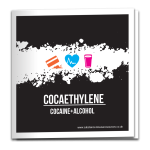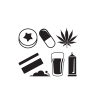COCAETHYLENE
Effects & toxicity explained
Learn about cocaethylene: what it is, how it forms when alcohol & cocaine are used together, the risks to your heart and liver, and simple steps to reduce harm.
What is Cocaethylene?
Cocaine and alcohol are increasingly being used together as a 'straightener' to keep the night going, allowing people to drink more alcohol and lessen the 'comedown' from cocaine. When you use these substances together, your liver automatically creates a third drug called cocaethylene. This new compound affects your body differently than cocaine or alcohol alone, creating both stronger effects and greater risks. The information in this guide will help you understand and minimise these risks.
Cocaethylene Effects
Cocaethylene increases both the duration and intensity of cocaine's effects. It stays active in your body 3–5 times longer than cocaine alone, creating a more powerful high. But the downside (yes, there always is one!) is that cocaethylene is also more toxic than cocaine by itself, causing both short-term and long-term physical and mental health problems.
Cocaethylene Risks
Health
Cocaethylene causes more severe increases in heart rate and blood pressure than cocaine alone. Even for perfectly healthy people, this increases the chance of seizures, heart attacks and strokes. For anyone with an underlying heart condition, this is extremely risky. Cocaethylene is more toxic than cocaine and stays in your system much longer, putting greater strain on your liver and other organs. Over time, this can cause serious damage.
Violence
Alcohol reduces your inhibitions, cocaine increases confidence, and cocaethylene amplifies both effects. This combination significantly increases the risk of impulsive or reckless behaviour, including violence.
Sex
The combined effect of cocaine and alcohol can significantly impact sexual performance. It increases sexual desire but makes it harder to achieve an erection and lubrication, and more difficult to reach orgasm. Prolonged attempts to climax can cause physical damage and increase the risk of sexually transmitted infections (STIs).
Important: Using sexual stimulants like Viagra with cocaine and alcohol puts massive strain on your heart and is not recommended.
Warning Signs
Cocaethylene itself doesn't increase addiction risk beyond what cocaine and alcohol carry individually. However, you can become accustomed to using both substances together, so that using one triggers cravings for the other. This can lead to dependency on both substances.
Some warning signs include:
- Using larger amounts of alcohol and cocaine to get the same effect, or to cancel out the negative effects of either substance
- Spending time thinking about when you are going to use next
- Having problems at home, work or university because of your behaviour or neglecting responsibilities
- Getting involved in violence or injuring yourself or others after a session
Taking Control
If you want to cut down or stop using alcohol and cocaine, the following advice may help:
- Use smaller amounts at each session and give yourself more time to recover between sessions
- Think about the negatives – financial problems, feeling rough all the time, relationship issues. Remind yourself of these when you feel the urge to use
- Avoid triggers like places or people you use with
- Take a break from certain friends, avoid specific pubs and clubs, and find alternative activities
- Tell someone what you're doing or ask a friend to support you. Having someone to talk to during difficult moments can make all the difference
- Don't give up. Breaking the habit is possible. If you don't succeed the first time, don't be hard on yourself – you've taken the first step. Try again!
Additional Cocaethylene Information
The information above is from our cocaethylene harm-reduction leaflet. It includes everything people need to reduce the risks of using cocaine and alcohol together.
The additional information below comes from questions we receive from clients and searches made on our website and takes a deeper dive into the science of cocaethylene.
How much stronger is cocaethylene than cocaine?
Cocaethylene isn't exactly "stronger" than cocaine, but it does affect you more intensely and lasts longer. When you use cocaine and alcohol together, your liver creates cocaethylene – and this new compound behaves very differently in your body.
Why it feels more intense:
- Lasts 3–5 times longer: While cocaine leaves your system quickly, cocaethylene sticks around longer
- Affects the brain more powerfully: It blocks dopamine more effectively than cocaine alone, creating a more intense high
- Builds up over time: Because it breaks down slowly, it accumulates if you keep using both substances
Key takeaway: While people might find the cocaine-alcohol combination more appealing because of these enhanced effects, the longer duration and increased potency make it a very different experience than cocaine alone.
How toxic is cocaethylene compared to cocaine?
Cocaethylene is more toxic than cocaine alone and carries a higher risk of overdose. Research studies consistently show that combining cocaine and alcohol increases the risk of fatal complications compared to using cocaine by itself.
What "more toxic" means:
- Affects the heart more severely: It causes more dangerous changes to blood pressure and heart rhythm than cocaine alone
- Impacts multiple organ systems: It's more damaging to the liver, lungs, and immune system compared to cocaine by itself
- Higher overdose risk: The combination creates unpredictable effects that increase the likelihood of medical emergencies
- Fatal cardiac events: Heart arrhythmias or cardiac arrest can occur without warning and can be fatal, even on first use
Research findings: Multiple studies have found that people who use cocaine and alcohol together face substantially higher risks of serious medical complications and fatal outcomes compared to those who use cocaine alone, though the exact level of increased risk varies between studies.
How is cocaethylene made in the body?
Cocaethylene forms automatically in your liver when you use cocaine and alcohol together through a chemical process that creates an entirely new drug.
How cocaethylene forms:
- Normal cocaine breakdown: When you use cocaine by itself, your liver breaks it down into two inactive waste products: benzoylecgonine and ecgonine methyl ester. These don't produce drug effects and get filtered out by your kidneys and eliminated from your body through urine.
- What changes when alcohol is present: When someone drinks alcohol and uses cocaine at the same time, something different happens in the liver. Instead of just breaking down the cocaine normally, some of the cocaine combines with the alcohol inside the liver to create a completely new active drug called cocaethylene. This process happens automatically – you don't control it.













